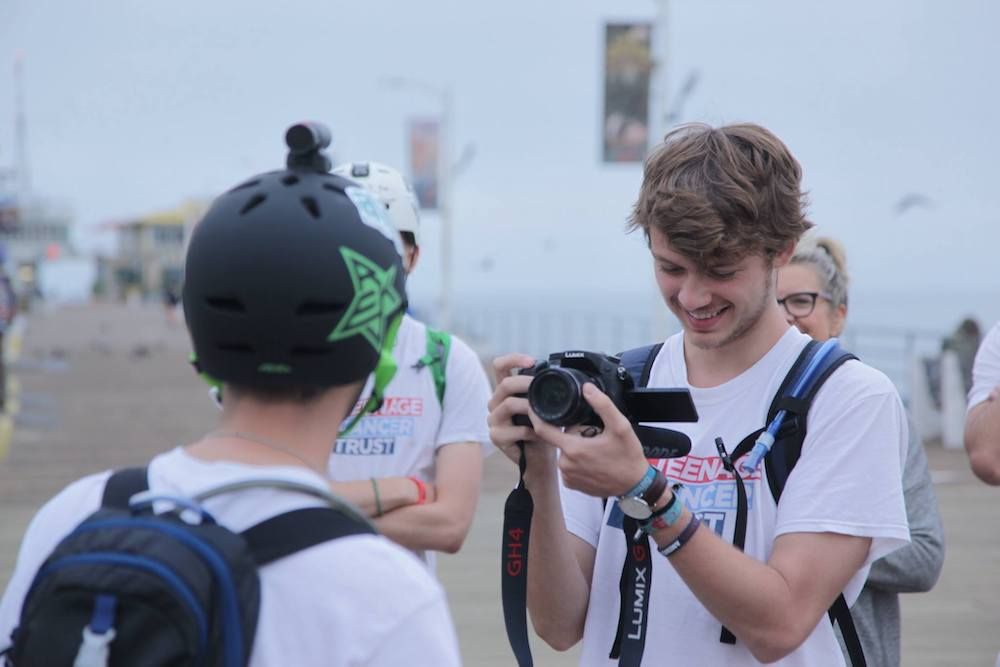As a teenager, Rupert experienced a period of debilitating anxiety – but, now, as a young entrepreneur, he’s using his experience to create supportive, uplifting environments for all
As a child, I was always very confident, excitable, and extroverted. I enjoyed acting in plays and was featured in several TV commercials. Despite getting very nervous before any performance, this didn’t affect me negatively. I knew I’d always relax into it after feeling apprehensive.
Fast-forward to March 2016. I was invited to a Google workshop, then asked to host a presentation the following week. I was to speak about how YouTube had enabled me to flourish as an entrepreneur, as well as the longboarding trip I took across America – from LA to NY – which I turned into a documentary.
I arrived at the workshop, having had little sleep the night before. I was asked to present some ideas in front of a group of people and, as I stood up, I suddenly got extremely nervous. It seemed to come out of nowhere and I could barely get any of my words out. My eyes got watery and I felt a huge lump in my throat. I thought I was going to burst into tears. I persevered and pushed through, but was concerned as this was something I had never encountered before. I felt that there was little explanation for why I felt so anxious.
I started feeling extremely stressed in the run-up to the second talk at Google the following week. Thoughts were constantly racing through my head that the same thing might happen again, even after trying to reassure myself. Anyway, the day came and my fears came true. Standing at the back of the room watching others present before my allotted slot, I became incredibly hot and flustered. I went and spoke to my account manager, and I was forced to pull out of the talk after having a panic attack just before I was due to speak.
I went and sat in the bathroom where I tried to calm myself down, but left the Google headquarters and went home extremely disappointed. Over the next couple of weeks, my mental health started to decline rapidly. I fell into what seemed like a bottomless pit. I found it incredibly hard to go out in public, and even struggled to take short trips out of the house to places like the supermarket.
Two of my mum’s friends came over to our house and I couldn’t even face seeing them. This is when I realised something was seriously wrong. I climbed out of our downstairs bathroom (so as not to be seen by my parents’ friends) and started running to the local GP practice. On the way, I called my mum to let her know my concerns. She knew this was completely out of character, picked me up in the car and drove me to the doctor.
I spoke to the GP about how I’d felt and what had happened. They prescribed me antidepressants, which I was reluctant to take, but knew I was in a bad place. On the way home, I asked my mum to drop me halfway down the road from our house so I didn’t have to be seen by my parents’ friends. This was a really low point for me.
At the time, it felt like I was never going to be able to do anything I had wanted to. How was I going to run a business when I was struggling to socialise or look anyone in the eye? I had a major trip hitchhiking through India coming up in two weeks, and I knew I was going to encounter many social situations outside of my usual comfort zone. Was it the right time, was I ready for that trip?
It was a difficult decision, but I decided to go to India. This is something that I had planned for a long time, and I didn’t want my anxiety to get the better of me or my career. Throughout my time abroad I filmed the 2,000 mile trip from Delhi to Thiruvananthapuram, Kerala. During the trip, the anti-depressants started to kick in, which helped. I completed the trip, and although I was still anxious, I came home feeling significantly better in myself for conquering some of my fears. Since then I’ve been building myself and my confidence back up over the last four years. It took a long time for me to feel confident in myself again, and as much as I was able to rebuild that, I am still working on other areas.
My company Perspective Pictures has grown a lot since 2016 and we’re now a team of 18. This means there are a lot of occasions where I have to address groups of people. As the founder and MD, I’m the face of the business, meaning I have to fly the flag and need to be able to communicate effectively with clients every day.
A huge milestone, that showed me how far I’d come, was when I was recently interviewed on Sky and BBC News. These events were a big thing for me. I was quite nervous beforehand but I had been having hypnotherapy in the run-up. The interviews went well, and I’m proud of what I accomplished – this is something I couldn’t have even considered a couple of years ago.
One of my big aims for this year is to keep on overcoming my public speaking fears. I’m very open with my team about my mental health which, in turn, has enabled them to be open with their mental health. We have a very positive environment at work and as much as we all have our struggles, I’m hoping we can create a supportive and empowering environment to champion our team. My experience with anxiety has helped me understand that people can be really unpredictable. We try to keep up morale in the company and encourage our staff to travel, so we have an unlimited annual leave scheme to support this. We also recognise how important exercise is for mental health, and organise monthly activities to get the team out of the office having some fun. We also did a charity Santa fun run recently for charity. We ran 10k in Santa outfits to raise awareness for young people with mental health problems.
As an entrepreneur, I believe it’s in our nature to challenge the status quo by looking at how and why things should be different. I think sometimes the stereotype of an entrepreneur is a hard, aggressive individual who’s unfazed by stressful situations. However, this is often not the case. I think the key to being a successful entrepreneur and a good leader is to be open and honest with your team, especially about mental health, and try to talk about any concerns your colleagues may have. It’s important at Perspective Pictures that we feel that we can all be a support to each other and not feel alone. I feel it’s important to lead with empathy, and understand people’s problems. In doing so, you’re much more likely to have a positive working environment, and efficient communication with others you work with.
Our expert says:
Rupert’s remarkable journey provides inspiration for anyone experiencing anxiety. The challenges of his career, at one point, created overwhelming anxiety that had a significant impact o his mental health. Rupert was able to recognise this and accessed support to overcome his mental health challenges. He now leads by example and is flourishing.
Rav Sekhon | BA MA MBACP (Accred) | Counsellor and psychotherapist
Need support? Reach out to a professional using counselling-directory.org.uk

